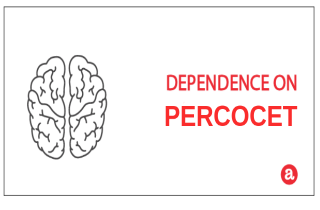Does dependence on Percocet (oxycodone) mean that you are addicted to Percocet? And how do doctors answer the question: “Can I just stop taking Percocet?” We’ll look at the difference between dependence on Percocet and addiction here. And give you the signs to look out for. Finally, we invite your questions about Percocet at the end. We answer all questions about Percocet with a personal and prompt reply.
What’s in Percocet?
People use Percocet to treat pain. Percocet is the brand name for a formula of oxycodone mixed with acetaminophen. Oxycodone is an opioid man-made synthetic drug which produces similar effects as morphine or codeine. Acetaminophen is a less potent pain reliever that helps to safely increase the effects of oxycodone. While you can overdose on acetaminophen, you cannot develop a depedence on it. You can, however, develop a physical dependence to oxyocodone. How?
Percocet dependence time: How long to be dependent on Percocet?
You can tell if you are dependent on Percocet when you stop taking Percocet. Basically, if you experience withdrawal symptoms when you stop Percocet, you’ve become physically dependent on oxycodone. But how long does it take for physical dependence on Percocet to start?
Dependency can develop as quickly as a couple of weeks or a month after taking Percocet every day. People who use Percocet to get high speed have a higher potential of developing dependency faster. Still, some people claim that it takes more than a month to creating a dependency on Percocet.
Percocet dependence vs. addiction
Being dependent on a drug doesn’t mean you are addicted to it. Even if you are using Percocet as directed you can still develop dependency. You can develop a dependence on Percocet if you are taking Percocet over an extended period of time. Being dependent on Percocet simply means that you can’t stop taking Percocet without the presence of withdrawal symptoms. However, the rate of dependency increases for those using Percocet outside the prescribed parameters. And some people who are dependent on Percocet can develop Percocet addiction over time.
If you are addicted to Percocet, psychological symptoms of cravings and compulsion to use accompany withdrawal. While many people never get addicted to Percocet, about 10% of those who take Percocet regularly will not be able to stop taking Percocet without having obsessive or compulsive thoughts about using Percocet again. If you suspect that you are becoming addicted to Percocet, speak with your doctor immediately. Treating Percocet addiction includes both behavioral as well as pharmaceutical interventions.
Dependence on Percocet symptoms
Key symptoms of Percocet symptoms encompass the following:
1. Increased tolerance to Percocet (needing more to feel the effects). Increased tolerance may just mean that you need to take more Perceoct to feel the effect of the pain relief. However this may be a flag for you to be aware of for the potential of developing dependence.
2. Needing to take Percocet in order to compensate for withdrawal symptoms.
3. The presence of withdrawal symptoms when you stop taking Percocet.
Physical dependence on Percocet
Dependence is the physical need to take Percocet in order for the body to function. Over time, your body begins to incorporate the main ingredient in Percocet (oxycodone) into the body system. Oxcodone then becomes part of the normal chemistry process of the brain. So, when you stop taking Percocet, you will experience Percocet withdrawal symptoms as your brain attempts to re-regulate the body chemistry. If you have withdrawal symptoms, this means that you’ve become physically dependent to Percocet.
Psychological dependence on Percocet
When you experience psychological dependence on Percocet, this could mean you have become addicted to the drug. Psychological signs of dependence may include the following:
- Doctor shopping in order to get Percocet.
- Crushing or snorting Percocet to feel the effects faster.
- You cannot stop yourself from taking Percocet.
- You have a compulsive need to take Percocet or take Percocet impulsively.
If you have a psychological dependence on Percocet simply tapering your medication may not work. This is when it may be helpful to seek help from someone who is trained to treat drug addiction. This person can help you not only detox from Percocet (oxycodone) but help give you the tools you need to to resist the psychological drive which compels you to take Percocet. Your doctor may recommend that you seek out help from a license psychologist, psychiatrist or other addiction specialist.
Percocet dependence withdrawal
If you are dependent on Percocet and stop taking Percocet suddenly, you will go through a period of withdrawal. This process is painful and at times dangerous. If you would like a more in depth understanding of the withdrawal process please refer to the following article otherwise, the symptoms you can expect to feel are:
- anxiety
- flu like symptoms
- insomnia
- muscle pain
- nausea/vomiting
- runny nose
- sweating
- seizures
Percocet dependence questions
Do you still have questions about Percocet dependence and addiction? We invite you to leave us your questions about dependence on Percocet below. We welcome all questions and try to answer each one personally and promptly









Related Posts